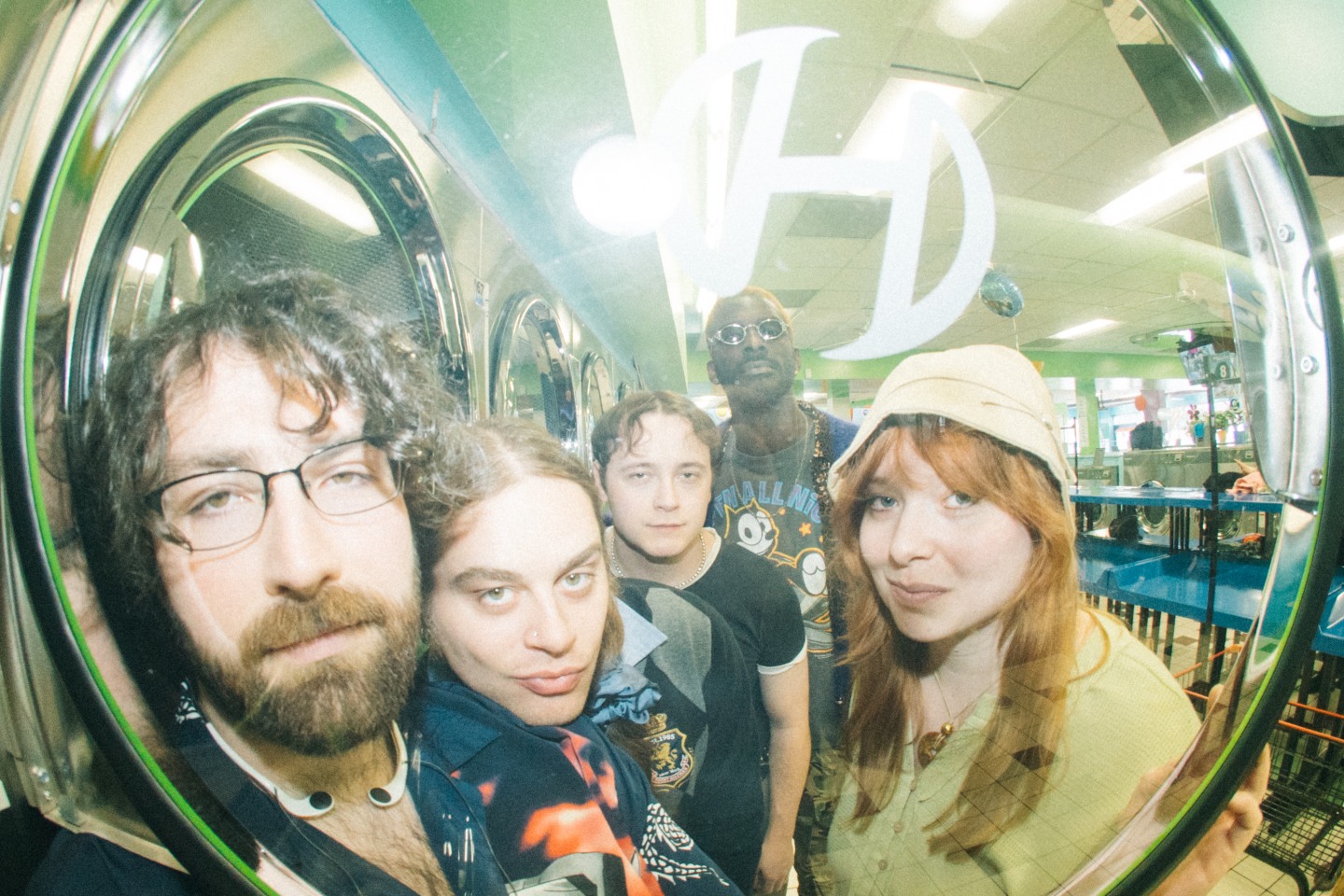 Wishy. Photo by Alexa Viscius.
Wishy. Photo by Alexa Viscius.
The FADER’s longstanding GEN F series profiles the emerging artists you need to know right now.
In numerology, angel numbers are considered lucky, a way for unknown forces to put you on the right path. Whether or not you believe in them is beside the point, acolytes say: they will appear in your life carrying a personal and spiritual significance. Kevin Krauter and Nina Pitchkites, the primary songwriters in the Indiana-based rock band Wishy, chose Triple Seven as the title for their project’s debut record. It’s a number representing self-discovery, personal growth, and intuition. It’s also the visual representation of good luck and fortune, a celebration of victory through a series of coincidences and flukes, a twist of fate in your favor, perhaps leading to a happy ending: enduring connection, maybe, or friendship.
“I think that’s the foundation of a lot of the music we do,” Krauter says, sipping a soda in midtown Manhattan’s Other Half brewery on a warm April afternoon. He and Pitchkites have retreated to the shade following Wishy’s performance at Rough Trade’s Indieplaza event. “We’re trying to tap into a place of joy, and a carefree perspective,” he says.
 Photo by Alexa Viscius.
Photo by Alexa Viscius.
Out in August on Winspear, Triple Seven is a venture of shimmering, ’90s-inspired dreamy power-pop and grunge. Krauter brings propulsive, vibrant layers of fuzz and distortion that recall Ride’s “Twisterella” or Teenage Fanclub’s magnum opus Bandwagonesque, while Pitchkites softens the dazzling technicolor with the airy warmth of her jangle-pop.
Krauter and Pitchkites met in high school in Indianapolis but didn’t truly hang out until college in the same state. Pitchkites was creating music as the electro-pop band Push Pop, while Krauter recorded solo lo-fi indie rock albums and played with Indiana guitar bands Matrix, Sacred Copy, and Hoops. Self-proclaimed musical Anglophiles (“It just so happens that a lot of the bands we like are from England”), they planned to tap their mutual admiration for each other’s music and form a band built around their love for indie-pop heroes the Sundays and British shoegaze. Then Pitchkites left for Philly in 2019 to be with her partner, and spent two years away before returning when the relationship ended. Back in Indiana, she and Krauter made good on their promise to start the band they’d dreamt up years before.
“I’d kind of given up on music,” Pitchkites says. “Not completely, but I was like, ‘It’s Covid. I can’t play out.’ It was awesome that he asked me and inspired me to start playing again.” She grins: “It all worked out, like every happy ending.”
Krauter and Pitchkites were impatient to crank up the volume and create heavier music, but with Nina as the primary songwriter of Push Pop and Kevin writing and recording his own solo projects, both were initially hesitant about the logistics of managing their various musical projects. They decided to merge the essences of their projects, enlisting guitarist Dimitri Morris, bassist Mitch Collins, and drummer Conner Host into their live and recording line-up, and creating one defining sound for their collaborative endeavor, now called Wishy.
We’re trying to tap into a place of joy, and a carefree perspective.
“It’s pretty much the same band in our mind,” Krauter says of their two worlds colliding. “It’s all the ‘Wishyverse.’”
The Paradise EP, Wishy’s previous entry into the Wishyverse, was sun-soaked and full of pristine guitar pop, bathed in the shiny twee of The Pains of Being Pure at Heart. “It was, for the most part, pretty tame,” states Krauter. “Going into this album, it was definitely more like, these songs are more rock.”
Triple Seven plunges an adrenaline shot straight into Paradise’s jugular. It’s their letter of intent as a band, years in the making; a gleaming, scuzzy lyrical exploration of the different shades of yearning, longing, dreaming, and desiring. As the songwriters of Wishy, Krauter and Pitchkites’ contrasting styles and song trade-offs complement and buoy one another, a push-pull of divergence and contradiction that create a fascinating whole. If Krauter eagerly embraces the void of infinite possibility, then Pitchkites tends to shy away from it. Their dynamic of soft-loud, heavy-light, works as emotional and cathartic tension, putting their own spin on Kevin Shields’s songbook.
 Photo by Alexa Viscius.
Photo by Alexa Viscius.
“We align melodically in a lot of ways,” Krauter explains. “Every main melody I hear Nina write, I’m like, ‘Fuck yeah. I love it.’”
“Ditto,” Pitchkites agrees.
Soaring, earnest, open-hearted melodies are abundant across Triple Seven, anchoring the whirlwind of noise and distorted guitars. “Love On the Outside,” sung by Krauter, captures the thrilling and intoxicating euphoria of a new crush, while Pitchkites’s “Little While” is their fully blown-out, total shoegaze endeavor, their take on Slowdive’s Souvlaki. On “Just Like Sunday,” Pitchkites somberly reflects on a former flame as she strives to become the best version of herself; Krauter’s dizzying opener “Sick Sweet” is turbo-charged garage-pop, longing for the very act of longing itself: “I’ve got a sick sweet dream and it’s tearing me apart inside.”
 Photo by Alexa Viscius.
Photo by Alexa Viscius.
 Photo by Alexa Viscius.
Photo by Alexa Viscius.
It’s pretty much the same band in our mind. It’s all the ‘Wishyverse’
Wishy had recently shot a music video for the title track “Triple Seven” in a casino; in one scene, the band members play the slot machines. Guitarist Morris was sitting down at one machine when the group had to act like he’d won; and then he did win, with the numbers landing on 777.
“The shot of us cheering is genuine,” Pitchkites remembers. “That was so fun. It was like someone was smiling down on us, saying, ‘We want you to have this.’
“I looked up the angel number and it had to do with spiritual growth and knowing yourself. That’s kind of what the song ended up being about, and it wrapped it up nicely.
‘Triple seven, we float into the sky,’ so it goes,” she continues, referencing the lyrics. “Every happy ending, you know?”
Triple Seven is out on August 16 via Winspear.